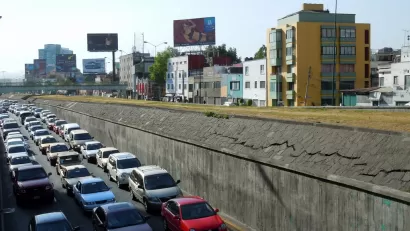The Daily Source of Urban Planning News

How Light Helped Remake Downtown Philadelphia
Neal Peirce looks at how Philadelphia has used light to help transform the image, and fortunes, of Center City.
NYC Unveils Plans for Cleaning Up One of Its Most Polluted Waterways
The EPA has released plans for how it intends to clean up Brooklyn's Gowanus Canal Superfund site. Branden Klayko reports on the $500 million, two pronged approach.
Has Europe Reached Its Car Peak?
Declining populations and economic malaise in many European countries are just some of the forces contributing to what most agree seems like a lasting decline in the continent's demand for automobiles.
Social Connections and Resilience
Are we growing more connected, yet further and further apart? And how does this bode for the resilience of the communities we share? Scott Doyon finds promise as of yet unfulfilled.

Glenn Beck Plans His Ideal City
The conservative commentator has proposed a $2 billion "city-theme park hybrid" that "would bring several of Glenn’s seemingly disconnected projects into one place." You'll be surprised at the similarities with certain Smart Growth principles.
Black Carbon Takes No. 2 Spot In Climate Change Agents
31 atmospheric scientists have written a new study on the major component of soot called 'black carbon', long identified with causing respiratory problems - and have shown how it is the 2nd most important agent of climate change after carbon dioxide.

How Mexico City Went From Commuter Hell to Paradise in Two Years
Mexico City's emergence as a "commuter's paradise" due to a focus on people and places, rather than cars and driving, has earned the city this year's Sustainable Transport Award from the Institute for Transportation and Development Policy (ITDP).
What Can be Learned from China's Copycat Architecture?
A new book on the subject argues that we shouldn't be so quick to discount China's increasing instances of architectural mimicry. The practice reveals much about 'the hopes, dreams and contradictions of China's middle class.'
What the Sandy Recovery Bill Gets Wrong
This week, the U.S. House of Representatives approved a two-part bill to fund the recovery from Hurricane Sandy. In an essay written prior to the vote, Rob Young criticizes the rush to approve rebuilding the entire coast as it was before the storm.
Vacancies Leave Obama's Environmental Agenda Unclear
With yesterday's announcement that Interior Secretary Ken Salazar will soon step down, the three top environmental posts in the federal government are waiting to be filled. The vacancies are further muddling the administration's second term agenda.
Mass. Transportation Plan Admirable, Funding Plan Abominable
In a preview of his statewide transportation plan, Mass. Gov. Deval Patrick unveiled an ambitious agenda and an appetizing menu of potential funding options on Monday. The final plan released yesterday has some wanting to send their meals back.
Wind's Future Remains Uncertain Despite Credit Renewal
While the wind energy credit was extended thanks to the fiscal cliff deal, don't expect to see a flurry of wind projects built and certainly it won't match last year's production. Much uncertainty remains for this renewable power industry.
The Challenge of Bringing Walkability to America's 99 Percent
Kaid Benfield proposes not only more walkable neighborhoods in the United States, where a pedestrian is struck by a vehicle every 7 minutes, but also more walking to reverse the country's alarming obesity trend.
Will S.F. Benefit from Dot-Com Deja Vu?
Yosh Asato compares the current dot-com and housing boom around South of Market (SoMA), the heart of San Francisco's tech industry, to previous booms that resulted in inevitable crashes. Is there an optimistic future for the city this time around?
Train in Stockholm Adds Unwanted Last Stop
Earlier this week, a rail-company cleaning lady in Stockholm was able to take a commuter train on a late night joy ride through the city. The joy, however, ended when she crashed the train into a tony apartment building.
Imminent Doom as Grand Strategy
What do three-pack-a-day smoking habits, triple-decker cheese burgers and sprawl have in common? They all offer immediate gratification and deferred consequences. But now the bill's coming due. Ben Brown lays out some ways to face the music.
Sandy Already Changing How Buildings are Designed in NYC
From roof mounted gas-powered generators to emergency floodgates and watertight mechanical rooms, developers and their designers in New York are already incorporating preventative measures into new and revised designs for their buildings.
Why Do People Ditch Transit?
Ryan Holeywell discusses a new report from researchers at the University of California, Berkeley that examines the top reasons people stop using public transit. Frequent, consistent service is most important to riders.
Could London Lose its UNESCO Status?
New high-rise towers spreading throughout central London are threatening the character of the city's most important historic sites, reports Martin Bailey.

Is Zoning to Blame for Brooklyn's Affordability Crisis?
As waves of gentrification sweep through the poor and middle class neighborhoods of New York City's outer boroughs, Stephen Smith argues that conservative, and outdated, zoning codes are to blame for the unequal balance between supply and demand.
Pagination
City of Mt Shasta
City of Camden Redevelopment Agency
City of Astoria
Transportation Research & Education Center (TREC) at Portland State University
City of Camden Redevelopment Agency
Municipality of Princeton (NJ)
Regional Transportation Commission of Southern Nevada
Urban Design for Planners 1: Software Tools
This six-course series explores essential urban design concepts using open source software and equips planners with the tools they need to participate fully in the urban design process.
Planning for Universal Design
Learn the tools for implementing Universal Design in planning regulations.


































